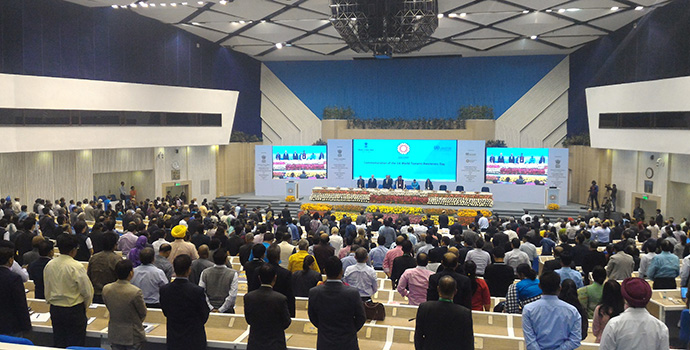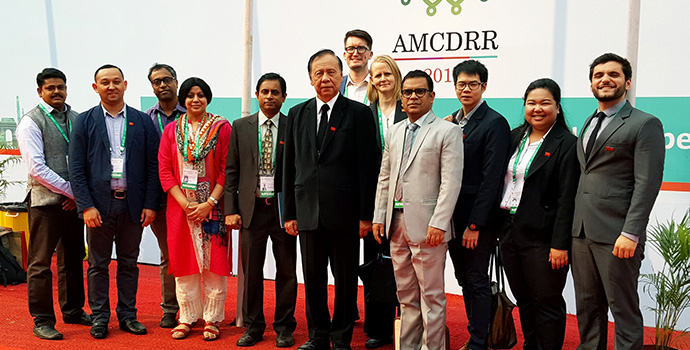- About Us
-
Who we are
-
- Publications
-
- ADPC Academy
-
MediaADPC'S NEWS
AMCDRR launches the Asia Regional Plan for Implementation of the Sendai Framework AMCDRR launches the Asia Regional Plan for Implementation of the Sendai Framework
2 - 5 Nov 2016
New Delhi, India

Participants stand for a moment of silence on 5 November 2016, the last day of the AMCDRR commemorating the first World Tsunami Awareness Day to honor those lost to Tsunamis and those working to reduce the risk.The Asian Ministerial Conference on Disaster Risk Reduction (AMCDRR) adopted the Asia Regional Action Plan in a bid to implement the Sendai Framework in Asia. Ministers and heads of delegates from around the region also endorsed the Delhi Declaration that calls for increased investment in disaster risk reduction for resilience including multi-hazard early warning systems and dissemination channels.
The Declaration recognized the importance of the application of science and technology, and research for evidence-based disaster risk reduction policies, practices and solutions, through international cooperation. It emphasized for increasing public and private investment in capacity building, science, and technology, innovation, critical infrastructure, and services, to contribute to the achievement of community resilience.
ADPC’s delegation, led by Dr. Bhichit Rattakul, Special Advisor, contributed to a number of discussions both at thematic and technical sessions in addition to attending the opening ceremony addressed by the Narendra Modi, Prime Minister of India. Dr. Bhichit spoke at the technical session on Understanding Disaster Risk and highlighted the importance of risk assessment for evidence-based planning and decision-making for disaster resilient development. Similarly, ADPC co-organized a featured event on Risk Resilient Infrastructure for Sustainable Development, and its experts contributed to the technical discussion.
Mr. Aslam Perwaiz, Department Head of Disaster Risk Management Systems at ADPC, made a presentation at a thematic session titled "Private Sector Engagement: Business Resilience and Private Sector Engagement in Disaster Risk Reduction – Shared Values, Survival and Better Business in a Changing World.” He elaborated on how the private sector can help reduce disaster risk in the region.
ADPC's delegation at the AMCDRR include members from the organization's headquarters in Bangkok, Thailand and from the project office in Bihar, India.ADPC's representation at the AMCDRR
ADPC’s delegation represented the organization during a variety of sessions and through the official ADPC booth at the AMCDRR’s marketplace where they met a variety of practitioners, partners, former colleagues and friends.
ADPC also participated in several pre-conference events including Engendering the Implementation of the Sendai Framework in Asia, a consultation of stakeholder groups comprised of individuals and organizations concerned with gender issues. ADPC staff also attended the Media Stakeholders Pre-Meeting to discuss the media’s role in disaster risk reduction and fulfilling the Sendai Framework.Technical experts from ADPC also contributed to many sessions including Enabling Governance for Coherence in Disaster Risk Reduction, Sustainable Development, and Climate Change; Disaster Loss Accounting and Data: Partnerships and Innovations for Improving Disaster Loss Accounting; and Disaster Preparedness, Response, and Recovery.
During the event, ADPC was recognized as one of the three judges for the AMCDRR short film competition. The event was organized by UNISDR and featured short films from three categories including the positive human impact of disaster risk reduction, disaster risk reduction for development, and adapting to climate change.
ADPC welcomes the Delhi Declaration and hopes it will help accelerate the implementation of the Sendai Framework for DRR in Asia.
Latest NewsRelated Trainings
-